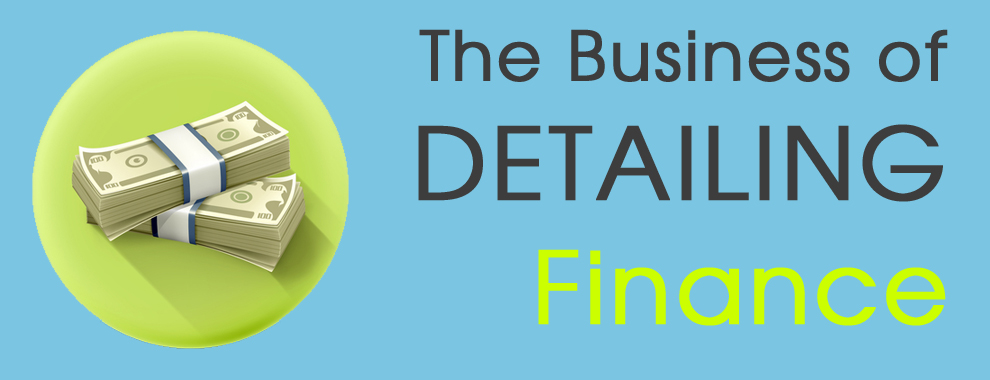
When running any kind of business there are many financial aspects to take into consideration when aiming to be successful, which includes any detailing businesses. In addition to your knowledge and skills to detail a car, boat, etc., you’ll also need a different skill set to help make your business profitable. In this article we will take a look at detailing from a financial perspective and things to think about whether you’re starting a business or you have been operating one for years.
Every detailing business has to start somewhere and a big part of the beginning starts with access to capital for products and equipment. If you’re in the situation where you have access to product and equipment to get your business started that’s great, but usually that’s not the case. If you’ve been operating a business you may still need access to capital for continued business operation, but at a certain point the capital may come from the money you profited over the years.
Now take into consideration the following points to operating the financial part of your business:
How Much to Invest
Create a business plan with detailed financial plans so you know exactly what you need. Assess what equipment, products, insurance, or space you need, you don’t want to overextend yourself so stick to the absolute essentials. If you’re a one person operation you will likely not need an elaborate shop setup of 5,000 square feet of space, start small, make money, and scale your business accordingly. If you’ve been in business, study the previous year’s spending and project out the next year’s expenses. We recommend you consult knowledgeable business people and others in the detailing industry to see if your financial numbers make sense, especially if it’s a new business venture.
Funding
After some careful planning you should have a good estimate on how much money you will need to start your business. If you are borrowing money, which is now debt, don’t forget about fees and interest that will affect your bottom line, if you can borrow money for free that is ideal. Look for loans or credit cards that have 0% introductory rates with reasonable rates long term. Keep in mind access to funding is not only important in the beginning of a business, but also important during times of growth or when there are new opportunities to grow your business. If a great opportunity arises to open a second location or take on employees for your expanding business it’s great to already have funding options lined up.
Organization
Staying organized will save you time and money, even if it doesn’t seem that way initially. Keep track of all your invoices, receipts, etc. in an organized manner for easy access. We recommend setting up a regular schedule for these tasks instead of waiting for taxes once a year. Small businesses, especially ones that take cash payments, are prone to being audited so be prepared. Businesses like Detailed Image keep a PDF file available for you on your “My Account” page so you can easily track and print out all receipts, but not all companies offer this service so stay organized.
Debt Management
If you carry debt, debt management is an important part of running a business and here are a few things to keep in mind:
- Cash Flow: If cash is a little tight, stretch your cash flow as long as possible during slow times; make minimum credit card and loan payments, pay your bills near due dates, request extended terms and postpone anything paid upfront if possible. You’ll be surprised what a few extra days can do for your cash flow. You might have to pay some additional interest here and there but this will keep your business running until you get through the slower period of cash flow.
- Keep track of due dates to avoid penalties. Use your smartphone or other software to set up reminders, so you don’t forget.
- Keep track of interest rates of your credit cards, loans, etc. and use the ones with lower interest rates to save money. Balance transfers can save you money, but keep in mind if there are balance transfer fees.
- Inventory management can also help manage your debt. Ordering at the right times and not overstocking can help your cash flow and lower your debt. Holding extra inventory has a cost to if you borrowed money to purchase it. More on inventory is in the next section.
- Review your debt and financial plan quarterly to ensure you are on the path to profitability.
Inventory
As mentioned above, managing your inventory can help the financial side of your business so here are few more points on inventory. You need to ensure you have enough inventory (ie polishes, pads, buffers, etc.) to complete upcoming jobs you have planned and unexpected ones, but you don’t want to go overboard. Suppliers and manufacturers will occasionally run out of items or phase them out so you’ll want to avoid being extremely lean. Therefore finding the balance of being careful but not going overboard is essential.
- Track your inventory to detect trends for more efficient ordering and usage of product.
- Look for products that maximize value like gallon size products that can be diluted. For example the Meguiar’s D101 128oz is $15.99 and you can dilute it 10:1, which creates over 1400 ounces of cleaning solution.
- Overstocking or purchasing items that are nonessential has an added cost associated if you’ve borrowed money to purchase it as mentioned above. Until you are financially stable try to be very conservative with non-essential items.
Inventory also takes up space which has a cost associated to it. It’s harder to calculate, but there is a cost. If you constantly overstock there’s a good chance the space you’ll need is bigger which means more space you’re paying for. This is especially true for large pieces of equipment. - Most detailers have plenty of pads and polishes, but what about backing plates or buffers? Do you have a spare on hand that if your backing plate or buffer breaks you can still continue to detail? If missing any one item can derail your detailing business it’s generally worth buying a backup.
- Wait for deals when you purchase inventory or seek out programs like the DI Wholesale program that is geared towards savings businesses money on everyday purchases.
We hope these points help owners of detailing businesses and prospective detailing businesses assess their business from the financial point of view. Each business will be unique but looking at the finances is absolutely essential to maximize profits. Please set aside some time to review your business and be as successful as possible!
Related Posts
- Detailing Business: Wealth, Fulfillment, Physical Health & Emotional Health
- Detailing Business Owners: Questions To Ask A Representative For A Ceramic Coating Company
- Heart to Heart with Business Owners
- My Experience At Mobile Tech Expo 2025 – Highlights And The Value Proposition
- Slogans And Product Gimmicks Vs. Detailing Substance
